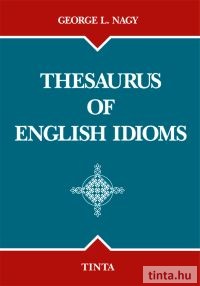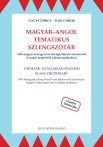- New arrivals
- Bundle product
- Márai-program 2025
- Mindenki angolul tanul
- Előkészületben
- Nyelvünk virágai
- Idézetek, szállóigék, bölcsességek
- Szólások, közmondások
- Felvételizőknek
- A magyar nyelv kézikönyvei
- A magyar nyomtatott örökség feltárása
- Anyanyelvi felmérők
- Anyanyelvi kompetenciafejlesztő munkafüzetek
- Az ékesszólás kiskönyvtára
- Bibliotheca Regulyana
- Diszlexia, diszkalkulia
- Életrajz
- Híd szótárak
- Iránytű sorozat
- Ismeretterjesztő
- Kétnyelvű könyvek nyelvtanuláshoz
- Kifestőkönyvek, színezők
- Kommunikáció
- Lexikográfiai füzetek
- Lexikon, enciklopédia
- Mesekönyv
- Mesterművek
- Modern Nyelvoktatás
- Naptár, notesz
- Notesz
- Növény- és állatnevek
- Nyelvészet
- Nyelvi játékok, fejtörők
- Nyelvtani munkafüzetek az 5-12. évfolyam részére
- Nyelvtanulás
- Segédkönyvek a nyelvészet tanulmányozásához
- Szépirodalom
- Szótár
- TINTA szótárak sorozat
- Magyar egynyelvű szótárak
- Kétnyelvű szótárak
- Történelem
- Útleírás
- Vallás
- Zene
- E-könyv
- Folyóirat
- 2025-ben megjelent könyveink
- 2024-ben megjelent könyveink
- 2023-ban megjelent könyveink
- 2022-ben megjelent könyveink
- 2021-ben megjelent könyveink
- 2020-ban megjelent könyveink
- 2019-ben megjelent könyveink
- 2018-ban megjelent könyveink
Thesaurus of English Idioms
 |
The Thesaurus of English Idioms is the first serious attempt in the English language to construct a dictionary of synonymous phrases.
The current collection contains:
- 1. 21,500 entries, including 12,500 core idioms
- 2. 9,000 cross-references with complete explanatory notes
- 3. 22,000 example sentences
- 4. 100,000 synonymous words and phrases explaining the idioms
The book has been designed for five distinct audiences:
1. students of English who would like to build a strong vocabulary
2. native speakers who wish to expand their idiomatic vocabulary
3. teachers of ESL (English as a Second Language) throughout the world
4. members of the general public, wishing to use the collection as a comprehensive reference guide to figurative English
5. lexicographers doing research in the field of phraseology
Statistically, the idiomatic categories covered in the collection can be broken down into the following groups:
- 1. Phrasal verbs 3,000
- 2. Catch phrases 700
- 3. Clichés 1,800
- 4. Proverbs/sayings 700
- 5. Binomials 900
- 6. Similes 700
- 7. Adverbial phrases 800
- 8. Word collocations 1,900
The most unique feature of the dictionary is its consistent application of Total Quality Management. TQM means that consumer satisfaction takes precedence over cost considerations. The result is the most user friendly dictionary ever written. Here are just some of the TQM features:
- 1. The 22,000 examples are short and to the point. They include about 3,000 brief dialogues.
- 2. The cross-references are fully developed, eliminating the need for a phrase finder index.
- 3. There are virtually no abbreviations in the book.

